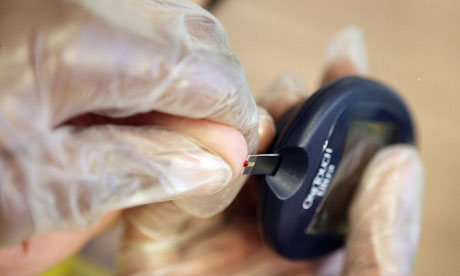
A third of adults in England are on the verge of type 2 diabetes, according to a BMJ Open study which I wrote about here. There is no doubting the importance of this news - every year, one in ten of those people will progress to full diabetes, which can cause death and disability, including blindness and amputations, if not well controlled. An astonishing 10% of the NHS budget is already being spent on diabetes. If nothing else prompted government to tackle obesity in a more robust way, this should.
The government's usual response is to talk up the Responsibility Deal, its voluntary agreement with the food industry and supermarkets on the saturated fat, salt, calorie content and labelling of processed meals and snacks. Plenty of people argued while I was researching my book that voluntary agreements were not good enough. Indeed, many of the giant food companies have opted out of one or more of the pledges. It's voluntary. They can.
But the pressure is mounting now for government to move to legislation - as they have somewhat unconvincingly said they would if voluntary agreements did not work (there is plenty of wriggle room, of course, over what "not working" actually means). The authors of the paper said that without more effective interventions than voluntary action by the food industry, the meteoric rise in prediabetes and diabetes will not be checked.
And Barbara Young, chief executive of Diabetes UK was forthright, speaking on BBC Radio 4's Today programme about the implications of the study. People must be warned about prediabetes and should go to their GP for a health check if they think they might be at risk, she said.
We need support, we need doctors to prescribe activity and diet support and we need the government to take steps to try and make it less of a trauma shopping for food because, quite frankly, everywhere you go, if you walk up the High Street there's high fat, high sugar foods facing you.
John Humphries, the presenter, interjected, suggesting she was saying there was a need to clamp down on unhealthy, sugar-laden food. This was her answer:
If this increase in prediabetes and diabetes isn't tackled now, it will wreck the health service - it will destroy the health service. Ten per cent of the NHS budget is now spent on diabetes and many of the problems the Secretary of State is trying to tackle, like too many people coming in as emergencies to hospitals, are about the one in six people in any hospital at any time who've got diabetes. So it's a massive impact on the NHS, it's going to get even bigger and I think the time has come for the government to wake up and smell the coffee, to start really pushing the NHS health check, which only 25% of people get, to start legislating for a healthier diet and more activity. The voluntary principle is clearly not working.
This is a crisis and the government is sleepwalking into this crisis.

